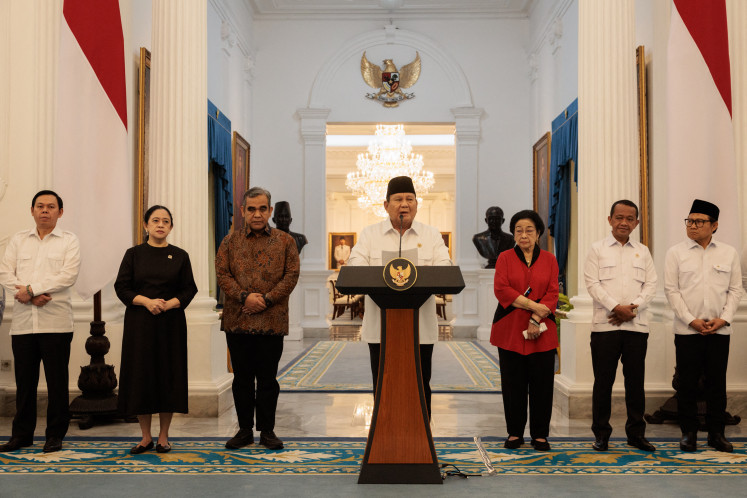Popular Reads
Top Results
Can't find what you're looking for?
View all search resultsPopular Reads
Top Results
Can't find what you're looking for?
View all search resultsUnderstanding corruption and three simple lessons to prevent it
Corruption has plagued societies for thousands of years and its recurrence is rooted in human greed.
Change text size
Gift Premium Articles
to Anyone
 On trial: Former communications and information minister Johnny G. Plate listens to the panel of judges’ interim decision related to a corruption case involving him in a hearing at the Jakarta Corruption Court on July 18. The judges turned down Johnny’s objection and ordered that the trial continue. (Antara/Galih Pradipta)
On trial: Former communications and information minister Johnny G. Plate listens to the panel of judges’ interim decision related to a corruption case involving him in a hearing at the Jakarta Corruption Court on July 18. The judges turned down Johnny’s objection and ordered that the trial continue. (Antara/Galih Pradipta)
To combat corruption effectively, we must first grasp the nature of the crime and how it operates, enabling us to draw crucial lessons that will help prevent its recurrence in the future.
Corruption can be analyzed from multiple angles, but let us delve into three fundamental areas: corruption throughout human history, corruption and government and corruption and law enforcement. By examining these aspects, we can extract vital insights for the fight against corruption.
Recent graft cases in Indonesia have raised serious concerns. With officials, even at the ministerial and Supreme Court justice levels, being involved, the sense of justice is coming under threat. Interestingly, corruption is not a new phenomenon. Its roots can be traced back over 4,000 years.
Around 2100-2050 BCE, in the ancient Mesopotamian city of Ur (present-day Iraq), King Shulgi issued the Code of Ur-Nammu, comprising 57 laws aimed at maintaining order and justice. Notably, it included a stern crackdown on corruption, bribery and abuse of power. Beside corruption provisions, the code also regulated property, wealth, marriage and trade laws. In a sense, it was similar to the omnibus laws introduced by President Joko “Jokowi” Widodo.
Fast forward a few centuries, around 1755-1750 BCE, King Hammurabi issued the Code of Hammurabi, in Babylon. It had 282 laws focusing on justice and protection of the weak. The code also specifically targeted corrupt judges who accepted bribes and delivered unjust verdicts. Like Ur-Nammu, the Code of Hammurabi served as an omnibus law.
The takeaway from these ancient histories is clear, that corruption has plagued societies for thousands of years and its recurrence is rooted in human greed. Our first lesson lies in strengthening anticorruption institutions, encompassing laws, enforcement agencies and supportive government policies. The leadership of Ur-Nammu and Hammurabi serves as a timeless benchmark.


















